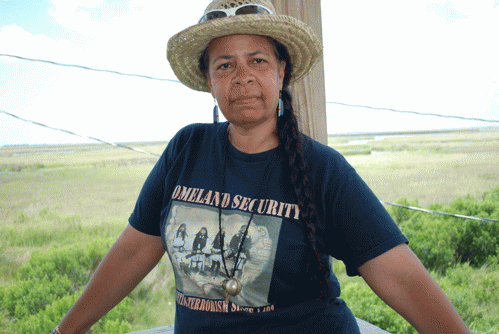The White Earth Indian Reservation in northwestern Minnesota seems far removed from the oil catastrophe unfolding on the Mississippi Delta on the Gulf of Mexico, until one realizes that Gaa-waabaabiganikaag (Ojibwe for "Where there is white clay") is a stone's throw from the headwaters of the Mississippi River. White Earth is also the home of Winona LaDuke, Executive Director of Honor the Earth. Among other things, and with a substantial resume behind her, including two stints as Ralph Nader's running mate on the Green Party ticket, LaDuke works on a national level to advocate, raise public support, and create funding for frontline native environmental groups. We met LaDuke over a cup of coffee, wild rice soup, and an unbelievably tasty arugula salad she grew and picked herself. We had barely settled in when LaDuke made a profound connection, provided a riveting image, and offered to help.
LaDuke said, "Honor the Earth made a decision in late June to apply $l0,000 of it's resources to support Indigenous communities advocacy in the Gulf of Mexico, in this time of disasters."
The original request was made by Faith Gemmell of Red Oil, A Gwichin Woman from Alaska, who has thirty years of experience in opposing oil exploitation and being forced to deal with oil companies, such as Exxon after the Valdez Disaster. Honor the Earth issued a challenge to other Native American Foundations and philanthropy to put resources into the Gulf, LaDuke said.
"I feel like we are watching the country being soaked in oil in the North and drowned with BP oil in the South. Oil is drowning our oceans and drowning our boreal forests." When she saw the question in my eyes, LaDuke was mildly surprised. "And you don't know about the Canadian tar sands? Well, THAT certainly got your attention."
It certainly did, and after a few minutes of explanation from LaDuke that the Alberta tar sands project is the "single largest industrial project in the world," and that 80 percent of Minnesota's oil comes from Canada, LaDuke's metaphor came into sharp focus. She handed me an article from USA Today that brought the magnitude of the Canadian project and its potential for environmental destruction home.
The anticipated route from Idaho's Port of Lewistown to Canada's Alberta oil sands will take the rigs along the banks of Idaho's Lochsa River, a world-class fishery and popular whitewater destination, and Montana's Blackfoot River, of author Norman Maclean's A River Runs Through It fame.The Athabasca oil sands are a massive deposit of bitumen -- a tar-like form of petroleum -- located in northern Alberta. According to the Government of Alberta Energy Department, bitumen, unlike conventional oil, requires intensive processing before it can be pumped into pipelines and transported to U.S. refineries. Environmental groups, such as the Polaris Institute, have called the Canadian oil sands "the most destructive project on earth."
National Public Radio reports TransCanada Corp. is planning a 1,600-mile pipeline from the Alberta tar sands to American oil refineries on the Gulf of Mexico. "TransCanada says not to worry. If there's ever a leak, the flow of oil will be quickly shut off."
Where have we heard that before? Another consideration is that the oil would be piped through hundreds of miles of wetlands--oil traveling through another "ocean" of water.
LaDuke did not mince words. "It is the most evil project on the face of the earth, and I want to do my part to stop it."
Her words echoed an encounter I had in Plaquemines Parish, Louisiana, deep in the heart of the Mississippi River Delta.
Only two weeks before, I was 2,320 miles away on Grand Bayou, meeting with another formidable Native woman, Rosina Philippe, of the Atakapa-Ishak. The Atakapa-Ishak are literally under siege from the massive river of oil that is spewing from the BP wellhead disaster. What lurked beneath the surface of Grand Bayou was unknown, and reports were trickling in of oxygen deprived sea life due to the unprecedented use of millions of gallons of Corexit dispersant on the surface of the Gulf waters at the source of the runaway wellhead.
When we met at the small boat landing at Grand Bayou Village, the first thing Philippe said was that it was critical that the voice of the Ishak community be heard as one. There were many voices on the battered Louisiana coast, but the People had one voice and she as their spokesperson would do her best to speak for them.
"We are the Atapaka-Ishak and this is our village in Grand Bayou," Rosina Philippe began.
A simple statement, but an affirmation of all that defines the People and their special relationship with the land and the water; the sky and earth; and the animal and plant life surrounding them in these ancient marshes. I thought about that statement as I sat across the table from LaDuke, and realized that these two women, although unknown to each other, were fighting the same battle. The People of White Earth are land-based and the Atapaka-Ishak are a water culture, but they are both under assault from oil and greed. LaDuke's drowning metaphor is all too real.
(Note: You can view every article as one long page if you sign up as an Advocate Member, or higher).







